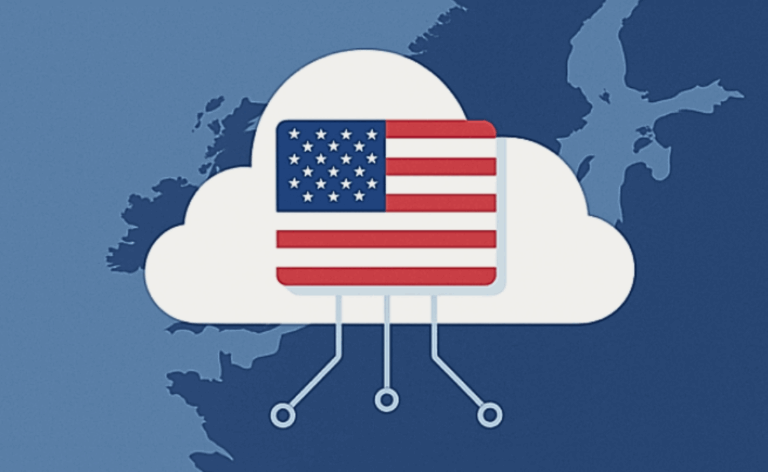Why the Origin of Your Cloud Provider Matters
4. July 2025
Companies across Europe face a critical strategic decision: Which cloud provider origin not only meets technical requirements, but also ensures data protection, compliance, and independence? The origin of the cloud provider has become a central concern – particularly for enterprises operating in Europe.
The Bitkom Cloud Report 2025 underlines this trend: 97% of German companies consider the provider’s country of origin when choosing their cloud partner. A similar picture emerges at the European level: according to a Capgemini study, 68% of public institutions see high legal risks related to being subject to foreign jurisdictions – such as the US CLOUD Act – due to their cloud provider’s location.
Trust Is Non-Negotiable – But Dependency Is
In Europe, dependency on non-European hyperscalers is increasingly being viewed as a risk. In Germany, 78% of businesses rate this dependency as critical, and half are actively revisiting their cloud strategies in light of geopolitical developments. Across Europe, more organizations are questioning their reliance on US-based cloud providers – not only due to regulatory uncertainty but also because of rising geopolitical tensions and growing cybersecurity threats.
Merely hosting data centers in Europe is no longer enough. Today, key questions include: Who controls the full technology stack? Who develops the code? And which legal system governs the infrastructure – including management, orchestration, and security layers?
Beyond Location – The Technology Stack Matters
Storing data in Hamburg, Zurich, or Madrid is insufficient if the control plane – the part of the cloud that governs the system – along with platforms, APIs, and security layers, remains under foreign jurisdiction. The same applies to software supply chains, patches, updates, and even access to metadata.
This is more than a legal debate – it directly impacts European businesses’ ability to act: resilience, cybersecurity, innovation, and digital sovereignty are all at stake. This clearly shows how the cloud provider origin is increasingly seen as a critical factor in risk assessment.
Cloud Models in Comparison – Control Is Key
Usage patterns reveal clear preferences, especially in regulated industries. In Germany, 74% of businesses use private cloud environments, while 59% rely on public cloud offerings. Similar patterns are observed in Switzerland and Spain, particularly in sectors like finance, healthcare, and public administration.
A recent McKinsey analysis emphasizes that this decision goes beyond compliance. While 75% of European businesses use cloud technology, only 20% realize its full economic potential. One major reason: lack of control over architecture, data management, and security – especially when relying on public cloud services from non-European providers.
Sovereign Cloud Models: Europe’s Answer
Sovereign cloud models are Europe’s strategic response. Private and hybrid clouds – operated according to European standards and within European jurisdictions – are the key to achieving both compliance and innovation. What matters is not just where the data is stored, but the complete technology stack:
- Control Plane Ownership: Full control over orchestration, network segmentation, and security policies.
- Zero Trust Architecture: Strict implementation of least privilege, microsegmentation, and role-based access control.
- Supply Chain Security: Control over the entire software and hardware stack, including updates, patches, and source code.
- Open Standards: Avoidance of vendor lock-in through interoperability based on OpenStack, Kubernetes, S3-compatible storage, and standardized APIs.
- Resilience: Protection against geopolitical risks, sanctions, and legal interventions beyond EU jurisdiction.
Despite these requirements, expectations for European providers are clear: performance and scalability must be on par with hyperscalers. According to Bitkom, only 7–8% of companies are willing to accept trade-offs in price or functionality for the sake of data sovereignty.
The message is clear: digital sovereignty must not be a luxury. It must become the standard – technologically, economically, and operationally.
Your Cloud. Your Location. Your Future.
The conclusion is obvious: data sovereignty, technological independence, and regulatory compliance are a business imperative. Companies in Europe that act decisively today are not only safeguarding their legal integrity – they are also laying the foundation for resilience, innovation, and long-term success.
This is exactly where CONVOTIS comes in: Our cloud solutions offer full control – high-performance, GDPR-compliant, and free from non-European influence. Our data centers are located exclusively in Germany, Switzerland, and within the EU. Our architecture combines top-tier security with the scalability and performance you expect from hyperscalers.






